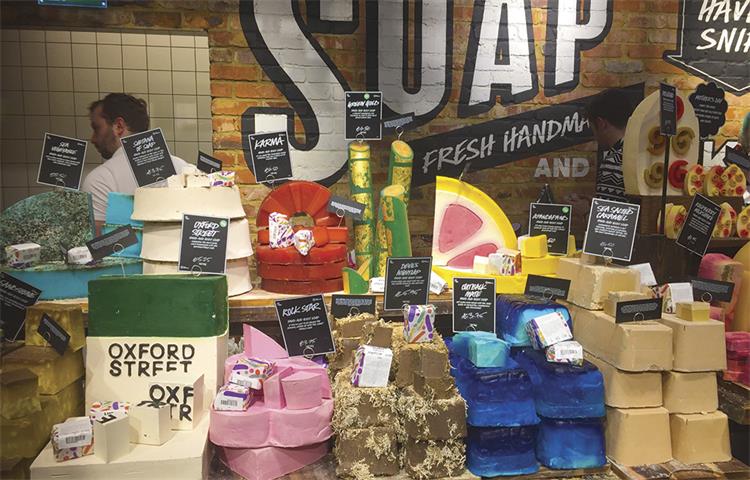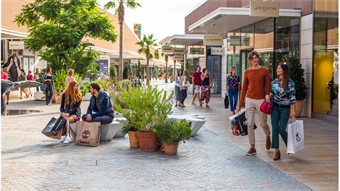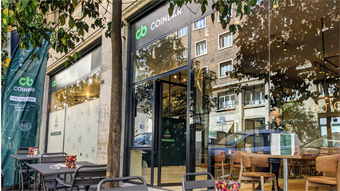Lush: The sweet smell of success
- In Special report
- 22:21, 24 April 2018
- 15126 Views

Lush is pure retail theatre – and it’s tantalisingly close to becoming a billion euro brand, reports Nicky Godding.
With over 900 shops in 49 countries and a growing e-commerce operation, the UK-born Lush Cosmetics Ltd, which invents, manufactures and sells cosmetics, knows how to perform, both in financial terms and in its physical stores.
A Lush store could be described as a theatre, but forget the smell of greasepaint. Inside the store customers are assaulted by the fabulous perfumes and creative visual displays which make most customers want to touch, smell and rub the products, then probably buy more than they meant to.
The retailer’s shop staff are its performers. Attentive, friendly and knowledgeable, chatting away about the products while offering hand massages to customers using Lush’s products infused with exotic essential oils.
Not just for Christmas
The price point is about right too. More expensive than the cosmetics most of us use on a daily basis, but not prohibitively expensive. It’s affordable luxury – like quality chocolate or a good bottle of wine.
The shops are jam-packed in the run-up to Christmas. Queues form out of the doors. A Lush gift box has broad appeal across ages and status, and they’re bought in their millions by children, young people and adults – men and women.
The products are 100% vegetarian and handmade, with minimal packaging. The company flags its ethical buying credentials and its commitment to fighting animal testing, but the do-gooding message isn’t rammed in your face when you enter the store. Lush stores are fun, colourful. What’s not to like?
If you want to forgo the in-store theatre and avoid the Christmas queues, you can buy everything online. The company rolled out a new website in 2016 and, despite some teething problems, on-line sales increased by nearly 18%.
‘Lush leads its competitors in terms of brand reputation for innovation’
Richard Hopping, Mintel
This Is a winning formula, which is why this ethically-driven retailer has reported a rise in profits of 36.5% on 2016 and an increase in its donations to charitable causes of £2.1 mln (€ 2.4 mln) to £8.3 mln (€9.5 mln).
But it’s not all been plain sailing. Its business in Japan has reported losses in recent years, though the company says they have been significantly reduced. It is working on bringing this market back to profitability by rationalising its store portfolio and opening new shops in strategic locations, such as a 1,580 m2 flagship site in central Tokyo in May 2019.
Its first full year of manufacturing in Germany, where Lush has made a substantial investment in a manufacturing plant, incurred greater losses than anticipated and lower visitor numbers in Hong Kong have affected its trading.
North America remains its largest retail market, where Lush reported impressive like-for-like growth of over 18% last year, and its UK retail business improved profitability by £4.5 mln (€5.1 mln). However, the company reports that growth has softened in the early part of 2018, with a decline in North America. This combination of reduced sales growth, increased capital investment and further losses in its German factory has resulted in the company forecasting a 40% decline in profit in its 2018 financial year.
Going continental
Since 2014, this one-time small store retailer has also been focussing on a larger shop strategy. As a result, Lush has more than doubled its average turnover per store. It has committed to open bigger stores in prime locations in specific markets – in particular unlocking the potential it sees in the French and German retail markets – which it thinks could be as lucrative as the UK.
Retail analyst Charlotte Pearce at data analysis company GlobalData likens Lush to The Body Shop, which has a similar proposition and cult following, ‘But Lush has kept its coolness and perhaps the ethical trading message is subtler at the younger retailer,’ Pearce says.
However, Pearce thinks that Lush, or indeed The Body Shop, can’t rely too heavily on their ethical strategies to retain their unique selling points. ‘Other brands are tapping into them.’
Like other cool brands, Lush has embraced Instagram and vlogging. It has four million Instagram followers in the US, and around 450,000 in the UK.
It brings out funky new products, recently creating a soap fidget spinner designed to keep its core customers talking about the brand.
The cosmetics brand has also found success with particular individual products during 2017, going viral on the internet and then selling out in stores. In August 2017, Lush’s Sleepy Body Lotion, featuring oatmeal, lavender and tonka, gained attention for helping people to get to sleep. Lush followed this up with the launch of Twilight Body Spray which has also been feted for its ability to aid sleep.
Growing up
But innovation isn’t limited to its younger market. In the last two years, Lush has launched Lush Spa, tapping into the leisure and service sector to keep its customers engaged. In October 2017, the brand made an experiential film using biometric data captured during a Lush Spa experience. The data was turned into a three-minute film to show the effects of a Lush Spa treatment on the body, further pushing the sensory experience of Lush’s products into the forefront of consumers’ minds, as well as helping the brand to stand out.
There are Lush spas in seven UK stores, including its Oxford flagship store Madrid, Kyoto, New York, Philadelphia, Sao Paulo and Hong Kong.
Pearce thinks Lush could expand its offer and range further. ‘The retailer could do more in the health and wellness sector, perhaps siting such an offering as the ‘cool’ version of the UK’s Holland and Barrett store. It has a broad range of shoppers, but there is more it could do in terms of dedicated ranges: young mums and babies for example. But this retailer has all to play for.’
Richard Hopping, Household and Brand Analyst at Mintel, agrees with Pearce’s analysis. ‘Lush also leads its competitors in terms of brand reputation for innovation. This is a key advantage for brands in this sector as value sales are stagnating with consumers primarily being driven by discounts and promotions.’
Sustainable development
Lush was launched in 2001 by Mark Constantine and Liz Weir in Poole, on the south coast of England.
Mark and Liz had met in the 1970s when Mark was working in a hair and beauty salon and he met beauty therapist Liz. Together, they set up a herbal hair and beauty clinic.
In the 1980s, they were selling products to The Body Shop, which was to go on to enjoy its own global retail success. The retailer bought out Constantine and co-director Liz Weir, and the partners launched Cosmetics To Go, a mail-order business which went under after a few years. Apparently learning from their experiences, the team started again and Lush was born.
They opened their first shop in their home town of Poole, followed by a second shop on the King’s Road in Chelsea, London.
According to reports, Lush tried to buy its bigger competitor The Body Shop, but in 2006 L’Oreal got in first. Last year, just over a decade later, L’Oreal announced its intention to sell the natural cosmetics retailer to Brazilian company Natura Cosméticos in a deal believed to be worth around €1 bn.
Natura Brasil is Brazil’s top cosmetics manufacturer and the country’s leader in the direct sales sector. It professes the same commitment to sustainability as both The Body Shop and Lush.
In a report by the UK’s Financial Times in June last year, João Paulo Ferreira, Natura’s chief executive, said: ‘The acquisition of The Body Shop is a decisive step in making Natura Group an international player in the cosmetics industry, following in the footsteps of our previous acquisition of Aesop in 2013.’
Lush is a privately-owned business and it has been reported that Mark Constantine has no plans to sell.
Charity commitment
Lush has always donated a percentage of its profits to charity. It focuses on innovative giving to small grassroots organisations working in the areas of the environment, human rights and animal protection. The majority of its funds raised last year were through the sale of its Charity Pot body lotion.
The retailer reported a rise in profits of 36.5% on 2016 and an increase in its donations to charitable causes of £2.1 mln (€ 2.4 mln) to £8.3 mln (€9.5 mln).






